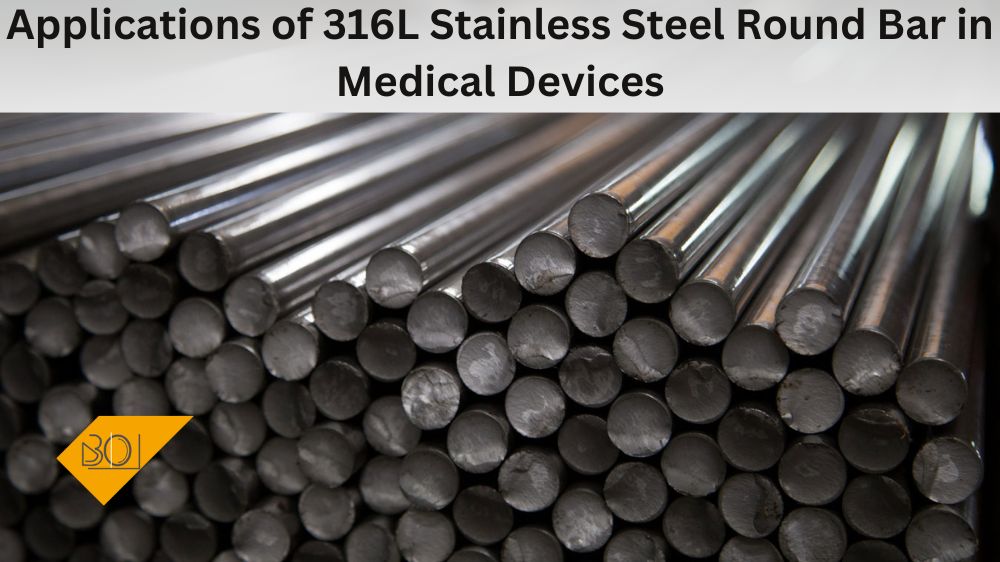316L Stainless Steel Round Bar is used in medical devices due to its superior corrosion resistance, durability, and biocompatibility. It has outstanding mechanical properties enable it to resist significant temperature and pressure changes associated with many medical procedures. Its low carbon content also helps prevent Chromium carbide precipitation during welding, thus eliminating the need for post-weld annealing. This makes 316L Stainless Steel ideal for use in a variety of medical implants or instruments such as catheters, orthopaedic implants, biopsy needles and heart valves. The material is also highly resistant to acids in food products and water supplies, further extending its applications within the food processing industry.
What is a 316L Stainless Steel Round Bar?
316L Stainless Steel Round Bar is a type of chromium-nickel stainless steel with a high corrosion and oxidation resistance, making it ideal for marine applications. It is extremely strong and durable, capable of withstand extreme temperatures while maintaining its shape and integrity. The round bar has excellent weldability properties and can be used in many industries, such as food processing, chemical processing, mining operations, automotive production, aerospace components manufacturing, etc. It also has superior formability, allowing it to be cut into custom sizes or shapes precisely. Its ability to resist wear makes it the perfect choice for any application that requires durability in harsh environments.
316L round bars are a type of austenitic stainless steel containing molybdenum. This alloy is widely used in the medical industry due to its excellent corrosion resistance, high-temperature strength, and biocompatibility. Medical grade 316L stainless steel has a low carbon content, making it resistant to sensitization and preventing intergranular corrosion. It can withstand many corrosive environments, making it a popular choice for medical devices undergoing harsh cleaning procedures.
Surgical instruments such as scalpels, forceps, and scissors are crucial in various medical procedures. These devices require a material that is both durable and corrosion-resistant. 316L stainless steel round bars are an excellent choice for surgical instruments as they can withstand harsh sterilization. They are also easy to clean and maintain, ensuring they are suitable for reuse.
Metal implants such as bone screws, plates, and stents require high strength and durability to avoid the risk of failure. 316L stainless steel round bars possess excellent mechanical properties, making them ideal for implant use. The material’s biocompatibility ensures that it does not cause an adverse reaction in the patient’s body, reducing the risk of implant rejection.
In the dental industry, 316L stainless steel round bars are commonly used in orthodontic wires, brackets and implants. The biocompatibility of this material makes it an excellent choice for orthodontic treatment. It is non-toxic, non-reactive, and does not cause any allergic or toxic reaction in the patient’s body.
Physical Properties of 316L Stainless Steel Round Bar
316L stainless steel round bar is an austenitic chromium-nickel molybdenum alloy with superior corrosion resistance and strength at high temperatures. It contains 16% to 18% chromium, 12% to 15% nickel, 2% to 3.5% molybdenum, and other trace elements such as sulfur and phosphorus. 316L Stainless Steel Round Bar Properties include excellent forming properties, good weldability, exceptional toughness at very low temperatures (cryogenic), high creep strength and stress rupture strengths up to 2200°F (1205°C). It also offers very good resistance in chloride solutions, which makes it ideal for use in food handling environments where corrosive agents are often present. In addition to its durability and performance in harsh climates, the 316L stainless steel round bar is non-magnetic yet retains its magnetic permeability when hardened or cold worked; this makes it a perfect choice for medical implants since magnetized parts cannot be used near sensitive electronic components. Finally, its ability to resist pitting when exposed to chlorides such as seawater or salt spray corrosion tests implies that this material can last under extreme conditions such as harbour installations or ocean engineering sites.
Conclusion:
In conclusion, 316L stainless steel round bars have numerous applications in the medical industry. Their excellent corrosion resistance, high-temperature strength, and biocompatibility make them ideal for various medical devices. Medical grade 316L stainless steel round bars offer durability, low maintenance cost, and longevity, making them a popular choice for medical devices. In the quest for superior quality, medical device manufacturers must consider the importance of material selection, and 316L stainless steel round bars stand out as a top choice.

